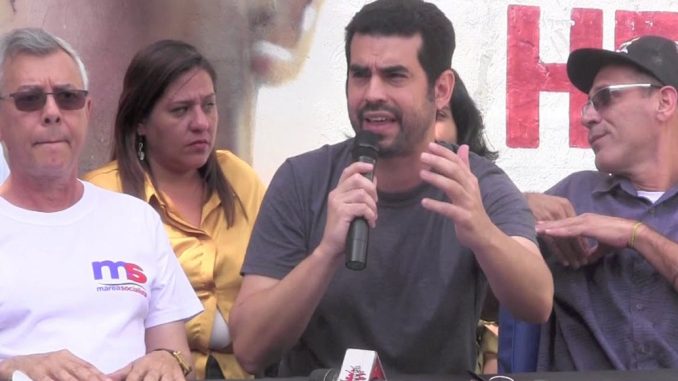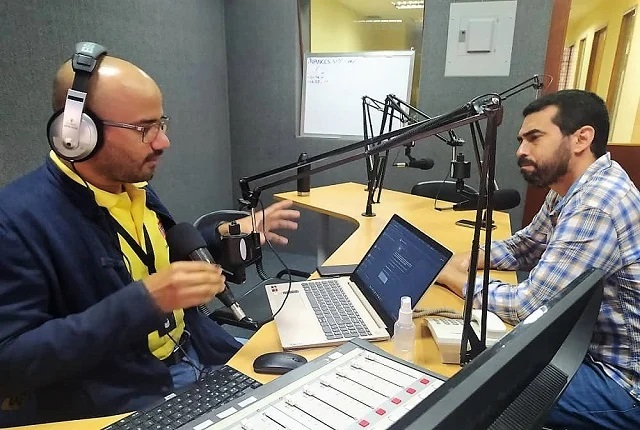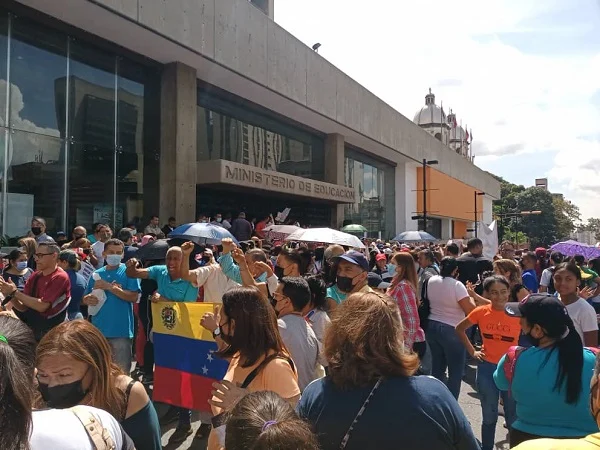
Interview of Gustavo Martínez Rubio, of Marea Socialista, in the program “Aunque usted no lo vea”, with journalist Frank Peña, on Radio Fe y Alegría, Caracas, 1390. Originally published in Aporrea.org
The host of the program, journalist Frank Peña in his introduction to the interview with Gustavo Martínez, of Marea Socialista, mentioned a topic that has been trending in recent days on social media, in the context of mobilizations of the workers of the teaching sector before the Ministry of Education to demand full payment of the vacation-recreational bonus and outstanding debts.
They became a trend in Venezuela due to the fact that these protests, in the school and university education sector, and also in the health sector, as well as in other areas of the public administration, have been linked to the massive demand of workers, teachers and professors, who ask the government to eliminate the ONAPRE Instructions (due to its severe implications for salaries and labor benefits).
They have also requested in the rallies that took place, that the situation of the collective bargaining agreements, which they consider to be quite violated, be reviewed. Protests took place throughout the country.
The government then proceeded to cancel the full vacation bonus, but there remained a “tense calm”, according to the interviewer’s opinion, because in spite of the fact that the bonus was paid, there is still a demand for the elimination of this Instruction, which has even caused conflicts of opinion within the “officialist” labor and political sector, and this is the framework of the conversation with Gustavo Martinez, leader of Marea Socialista.

Frank Peña asks about the follow-up and appraisals of Marea Socialista on the wave of mobilizations and how the governmental response has fallen.
Gustavo Martinez comments that although the working class as a whole still does not know exactly what the ONAPRE Instruction is and means as such, it does know the labor and economic policy of the government, because “the ONAPRE Instruction does not fall from the sky, it is not an abstract thing which has nothing to do with the policy of the government and of its peers the businessmen; this is very important to emphasize”.
He refers to the fact that it has some precedents and mentions that in 2018 the government issued Memorandum 2792, which, although it was the government who shaped it, the private sector, took possession of that memorandum… and the ONAPRE Instruction comes to have an even greater scope from the point of view of the interests of the workers. He refers to the fact that instruments such as these are little known among the workers, but they do feel their effects, and that is why the working mass rebelled against them, as has happened with the demonstrations and protests in the streets.
He points out that “the working class has been suffering for years the consequences of the application or implementation of a whole policy that we in Marea Socialista characterize as anti-worker and anti-popular, and which has all these consequences of having poverty wages, without benefits…”. To this he adds the “repressive policy” of the Venezuelan prisons of union leaders and workers imprisoned for fighting; and it is there where Martinez frames what the ONAPRE (National Budget Office) Instruction represents.

Gustavo evaluates that “the response has been very positive on the part of the workers”. He emphasizes that not only the teachers’ workers have mobilized, but also university workers in general, including teachers, administrative personnel and workers of the universities, and other sectors of workers who have been protesting in the streets, such as the workers of SUPRA-Caracas (urban waste collectors), for which he estimates that “it has been a nationwide response”.
With respect to the leaders of “the so-called Central Bolivariana Socialista de Trabajadores”, Martínez expressed his opinion on the “technical table” in which they announced the cancellation of the bonus, after having called for a pro-government march: “it must be understood, because it is really a maneuver of the government and of the union bureaucracy, it is not a ‘reconsideration’ of the national government not to continue paying the bonus in a fractioned manner… because what the government is doing is trying to foist it on the CSBT bureaucrats, who just a few days ago said that the government’s policy had to be defended… that the blockade issue had to be understood… that the working class had to make the sacrifice… No! It is the mobilization that makes the government back down.” “This is very important – Martinez continues – because it has to do with what method of struggle to continue from now on.” “The government backed down, but not in the policy itself; its policy has not yet been defeated.” “The central demand is (and there are going to be new mobilizations) that the ONAPRE Instruction be repealed.” “He backed down because of the national mobilization, and that is the lesson that we workers must take.”
The route proposed by Marea Socialista is to “continue mobilizing and advance to higher levels of organization”. “We must achieve the repeal of the ONAPRE Instruction, but we must also think of a plan of struggle at the national level that aims to confront the bulk of the economic and labor policy of the national government.”

The interviewer referred to the fact that he had noticed that in the mobilizations there were groups that found it difficult to reach an agreement and unify the struggle; to which Gustavo Martinez replied that “Marea Socialista is part of a space called Espacio Sindical Unitario, which groups together a series of union organizations, political currents that make life within the working class, and which recently held a National Meeting of Workers at the Central University of Venezuela (UCV), and there were some central agreements: One was to continue in depth the struggle against the ONAPRE Instruction and in that space it has been considered that it is necessary to advance with more articulation of all the struggles. This has to do with the dynamics and the reality of the Venezuelan workers’ movement… There are sectors… We, for example, bet on the absolute political independence and the autonomy of struggle and class of every movement that has to do with the workers, among them the trade union movement”.
Gustavo insists again that “the situation we workers are in is explained by the role of the government, which is an anti-worker, anti-popular and very bosses’ government, which has also given shape to a regime (and he clarifies that government and regime are not the same thing) designed by the government but which is very beneficial for the bosses’ sector in general, including, of course, the private sector. Just look at the bulk of the government’s economic policy and who are the first to applaud it: Fedecámaras, Consecomercio…”.
“So, the crisis we have can be explained from there, from the role of the government, from the role of the businessmen; but it is also explained by the way the trade union movement is, the labor movement in general, very disintegrated, divided… and that is a gain for the bosses”.
Hence, according to Martínez, from the United Trade Union Space, they propose to advance towards the possibility that, around a common plan of struggle, they can articulate and all the struggles meet, organize themselves, to obtain the greatest possible unity of action at the national level, as for example in the face of the ONAPRE Instruction.
He concludes by saying that: “The workers from below are giving signals, they went to the streets”, so that they repeal it, and “now that the government has recanted with the measure of paying the vacation and recreational bonus, that the mobilizations do not decrease but continue to qualify, and advance”.
AUDIO of the interview:








